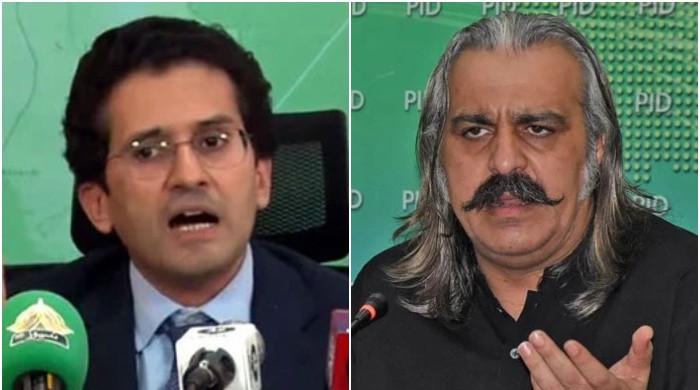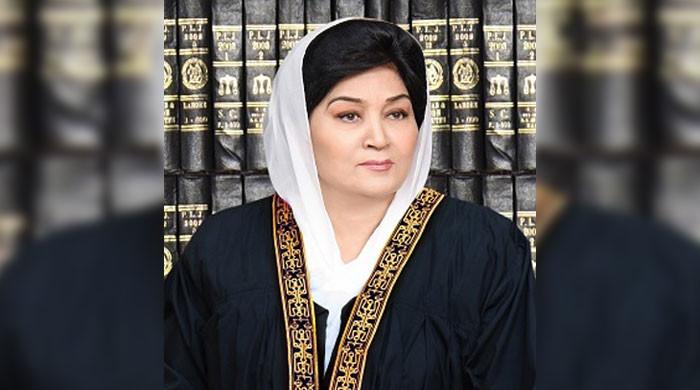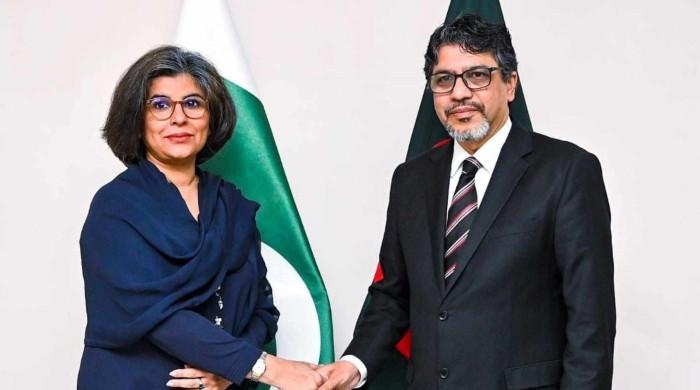'CJP agrees with Justice Dogar's transfer to IHC being controversial'
New IHC CJ should not be considered for SC role till seniority issue resolved, says Akhtar Hussain
February 11, 2025

- CJP's opinion of personal nature, not judicial stance: Akhtar Hussain.
- "IHC CJ to not be considered for SC role till seniority issue resolved."
- He clarifies no harsh words exchanged during JCP proceedings.
ISLAMABAD: Amid the seniority issue surrounding the transfer of Justice Sarfraz Dogar and his position as the senior puisne judge of the Islamabad High Court (IHC), it has come to light that Chief Justice of Pakistan (CJP) Yahya Afridi himself considers the said judge's transfer "controversial", The News reported on Tuesday.
The revelation was made by Judicial Commission of Pakistan (JCP) member Akhtar Hussain who expressed concern over the seniority issue of Justice Dogar, describing his transfer as "controversial" and saying that the CJP personally agreed with this view.
However, while speaking on Geo News' programme 'Aaj Shahzeb Khanzada Ke Saath', he noted that CJP Yahya clarified it as being his personal opinion and not a judicial stance.
Hussain's disclosure comes against Justice Dogar's transfer to the IHC from the Lahore High Court (LHC), after which the IHC administration revised its seniority list and designated him as the senior puisne judge.
Following this transfer saga, five IHC judges raised the issue of seniority of judges and sent a representation to the IHC chief justice against the new seniority list and also sent a copy to CJP Afridi.
The judges — Justice Mohsin Akhtar Kayani, Justice Tariq Mehmood Jahangiri, Babar Sattar, Sardar Ejaz Ishaq Khan, Arbab Muhammad Tahir, Saman Rafat Imtiaz and Miangul Hassan Aurangzeb — argued that any transferred judge must take a fresh oath under Article 194 of the Constitution, which would place them at the bottom of the IHC’s seniority list.
This would render them ineligible for immediate consideration for the position of IHC chief justice.
This was followed by Justice Dogar, along with Justice Khadim Hussain Soomro from Sindh High Court and Justice Muhammad Asif from Balochistan High Court's transfer to the federal territory's court.
Meanwhile, the JCP's meeting on Monday — boycotted by Pakistan Tehreek-e-Insaf's (PTI) Barrister Gohar Ali Khan and Senator Ali Zafar, and two Supreme Court judges, Justice Mansoor Ali Shah and Justice Munib Akhtar over the pending of 26th Amendment issue — appointment six new judges to the SC.
The judges elevated to the apex court include chief justices of all high courts, except the Lahore High Court (LHC) were among the six judges nominated.
These included Justice Muhammad Hashim Khan Kakar, Justice Muhammad Shafi Siddiqui, Justice Salahuddin Panhwar, Justice Ishtiaq Ibrahim, Justice Shakeel Ahmad and Justice Aamer Farooq.
Expanding on the all-important huddle, Hussain clarified that no harsh words were exchanged during the proceedings.
He explained that during the meeting, SCsenior judge Justice Shah raised concerns over the 26th Amendment and the appointment of new judges.
Justice Akhtar supported his position, suggesting that the JCP should delay the meeting until the issues surrounding the 26th amendment and the seniority of judges transferred to the IHC were resolved.
However, CJP Yahya rejected the proposal, asserting that it was the JCP's constitutional duty to proceed with the meeting and that it could not be postponed, he added.
On Justice Dogar's seniority issue, the JCP member opined that, in his view, until the seniority issue was resolved, the newly appointed chief justice of the IHC should not be considered for a role in the SC.
In the same meeting, it was suggested that Justice Aurangzeb be appointed as an acting SC judge, which Hussain stated was unanimously approved by the commission.
He added that after the appointment of six new judges, a further appointment for taxation matters was deemed necessary, and Justice Aurangzeb's name was subsequently presented and accepted without objection.
Regarding the LHC's role, he went on to say that the appointment of judges from LHC was delayed due to reservations about two particular judges.
Following the appointment of six SC judges, it was agreed that the selection from LHC would be revisited at a later date.
He clarified that the decision was not politically motivated but was a matter of internal discussion among the JCP members.
On the issue of the 26th Amendment, the JCP member stressed that the Constitutional Court should make a definitive ruling and underscored differing opinions within the legal community — contrasting views of the Pakistan Bar Council (PBC) and Supreme Court Bar Association (SCBA), to be precise.
He expressed his personal belief that constitutional issues should be approached from a judicial, rather than political, perspective.
"There are two competing views — one from PTI, the other from the government," he said, adding: "As an institution, we must remain independent and address constitutional matters constitutionally".











